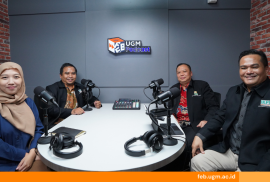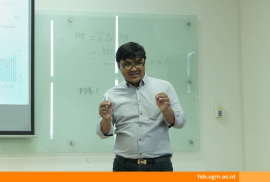Thursday (27/10) the Faculty of Economics and Business, Universitas Gadjah Mada (FEB UGM) held the Brown Bag Seminar. The seminar was held in the Auditorium Room, 8th floor of the FEB UGM Learning Center Building. In carrying out this seminar, FEB UGM collaborated with MD FEB UGM and the FEB UGM Laboratory. The speaker at this seminar was Wisnu Setiadi Nugroho, SE, M.Sc., Ph.D., as a Lecturer in the Department of Economics, FEB UGM, with the topic presented “Geographical Poverty In Rural Indonesia: Isolation and Disasters.”
This event was moderated by Heni Wahyuni, SE, M.Ec., Ph.D., as Head of the Master of Science Program in Economics. This event was opened with a brief introduction about Wisnu who had just completed his doctoral degree from the University of Toledo. In this seminar, Wisnu presented his paper and brought up problems related to persistent poor areas. In writing his paper, Wisnu takes the definition of poverty from Amartya Sen who is an Indian economist and philosopher. According to Sen, poverty is living below specific standards, such as lack of access to food, safe drinking water, sanitation facilities, health, education, and information. Factors causing poverty include geography, demography, ethnicity, race, family, and others.
Wisnu explained the theory of the “Poverty Environment Trap” which explained that the poverty trap occurs because marginal environmental conditions guarantee low yields and soil damage in the area. The low production yield is caused by environmental conditions, inadequate access to markets, and farming methods that are still very traditional. In addition, Wisnu also explained that the factors that cause the poverty trap are the frequency of disasters such as floods and droughts, geographical locations in the mountains, less profitable land, physical isolation, and remoteness which lead to lower levels of asset accumulation.
Wisnu explained that his main contribution to this problem, which takes the subject of Indonesia, is the State of Indonesia as a country that has a lower middle income with agriculture as the main sector, and has a high frequency of disasters. In this case, Wisnu uses assets and welfare proxies as measuring tools and poverty factors that can explain stagnant consumption growth. In compiling the paper, he explained the origin of the data used, the literature review used, and how to process the data obtained. After that, the seminar continued with a question and answer session led by the moderator as well as the closing session of this event.
Reportage: Merisa Anggraini
Watch the full video: https://youtu.be/_Nzm4QknjpA




